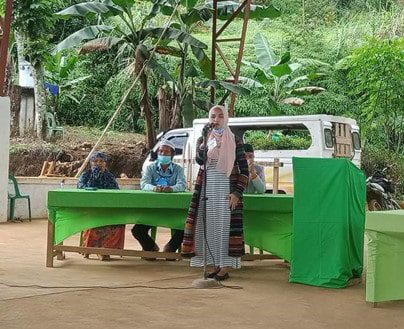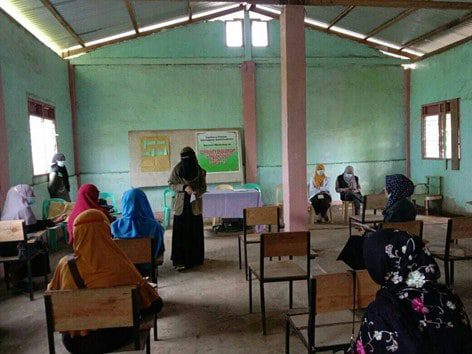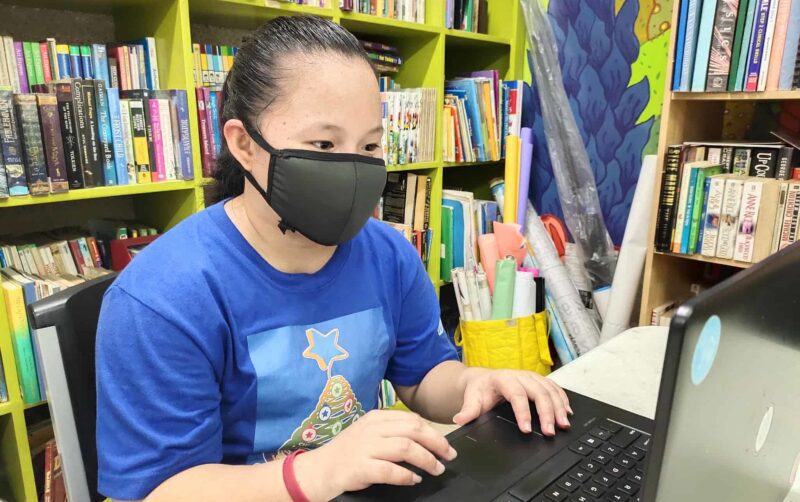When Nafisah Ibra Abolais, 23, found out about the opportunity to tackle COVID-19 misinformation in her town, she did not hesitate to join in. She and other young people in Piagapo, in the Bangsamoro region of the Southern Philippines, were willing to travel across the city because things like this don’t usually happen in their town.

At first, Nafisah thought it was a daunting task. As a young person, or Kalumbayan in the local language, she worried it might be difficult to coordinate with people of authority – teachers, doctors, and local leaders. “Nonetheless, we will do this. We will find ways,” she said.
In fact, young people working in their own communities are a key solution to one of the biggest challenges of the pandemic so far.
Through a partnership with Internews’ Rooted in Trust project, a local youth organization has trained more than one hundred young people across the region to become Information Hygiene Ambassadors. These young people are tasked with creating community-based action plans that aim to ensure everyone in their community has access to quality information and knows how to recognize health misinformation.
“The Rooted in Trust Project has changed the lives of many young [people ] especially in this pandemic where uncertainties create fear and [the] sudden shift to digital world makes others unable to cope,” said Annas Deriposun, project officer at the Coalition for Moro Youth Movement (CMYM) the local organization directing the Ambassadors. “It has opened opportunities for the youth to focus on important and relevant issues during this pandemic—the massive spread of fake news and rumors.”
Ambassadors organize open meetings between religious leaders, health workers to dispel rumors
The youth Ambassadors took part in traingings to build their own skills in fact-checking, verification, and rumor collection. They learned about critical thinking, recognizing trustworthy sources, and how to have respectful discussions with community members who might be prone to misinformation.
Internews rumor analysis has reported growing tensions around the number of cases reported locally and community perceptions that hospitals are mis-reporting figures to attract funds. This rumor was exacerbated by eroding trust in officials after an investigation into the government insurance agency for misuse of COVID-19 funds.
The Ambassadors organized a workshop where one hundred Morits (local students of Arabic and Islamic education) and Ustadz (religious scholars and leaders in the community) from a local school discussed the impact of the pandemic and practical steps to reduce the spread of the virus. Most of participants openly denied the existence of the virus.
Rural Health Officer Ainah Lijandra Gandarosa Ramos, a nurse, used the workshop as an opportunity to chat with local youth and explain some of the rumors that have been circulating about the virus.
“We test our patients who exhibit symptoms of COVID-19 to see if they are positive. That is one way to know if they have the disease. In Amai Pakpak Medical Center (the biggest hospital in the province), it has a separate building for COVID-19 patients, and it also has separate buildings for non-COVID-19 patients. There is no way that they make people positive on purpose,” Nurse Ramos said.
“Please do not be scared of us, health officers, because we will never cause the death of our fellow men. We are here to help and cure people,” she added.

Meanwhile, in the town of Lumbaca-Unayan, where there is no internet and electricity is unstable, people rely heavily on information spread through word of mouth. Asniah Olama, one of the Information Hygiene Ambassadors in this town, saw how difficult it is for them to access right information. “We can only rely on what we hear from others,” she said.
“The unstable electricity and weak signal reception are the main hindrances from accessing quality information in Lumbaca-Unayan. According to the linemen, nothing can be done since we are in a secluded part of the region and big trees are blocking the electric line. This is why we cannot be easily reached through our phones,” Asniah said.
Most Ustadz here generally believe that COVID-19 does not exist. They feel the government and health officers are using the pandemic to attract funding. To address this concern, the Kalumbayan organized a community event in November where they invited the Ustadz and local Municipal Health Officers to discuss their concerns together.
One of the Ustadz asked a question, “Is it true that the medicines like the vaccines are distributed by the government and President Duterte in order to kill or cause the death of the people, especially the young ones?”
Dr. Sittie Naida Guro, the Municipal Health Officer of Lumbaca-Unayan remarked that their lives are threatened because of the spread of fake news such as the question just posed. “It is disheartening that people fear the medicines or vaccines that the health officers distribute. We are not here to inflict or cause pain to the community. We only want to help.” She narrated the challenges faced by her team during campaigns for health awareness and their recent distribution of polio vaccines.
The event ended with the Ustadz promising to study more information about COVID-19, to share them with their children and to follow health protocols. The health officers also pledged to continue in helping and promoting health awareness on COVID-19 in Lumbaca-Unayan. CMYM has plans for similar programs in neighboring towns.
Tracking rumors to understand their power
Rooted in Trust, supported by the USAID Bureau for Humanitarian Assistance, works across seven countries to collect and analyze rumors and misinformation about COVID-19 and to work with local trusted information providers, like local media and community organizations such as CMYM, to improve access to quality information to help people make informed decisions.
In the Philippines, Rooted in Trust has collected more than 400 rumors related to COVID-19 circulating in the Bangsamoro region. Twenty-five percent of the rumors collected in the region from September to December 2020 were about the government, including allegations of corruption and criticisms on pandemic response. One example of a post jokingly said that the advantage of testing positive is that you escape hospital expenses . This post relates to accusations that hospitals tag patients as COVID-19 positive to claim a government health insurance package which covers costs for COVID-19 patients. This single post reached 763 reactions, 171 comments, 69 shares among 39,258 followers as of November 11.
Millennials shared the most rumors online. In the Philippines, 83% of social media users are between 18-34 years old. With Bangsamoro having a young population, it is not surprising that 45% of rumors collected were from the 18-35 age group.
Community-led initiatives of information hygiene ambassadors like the Kalumbayan of Piagapo and Lumbaca-Unayan helps prevent the spread of misinformation as it happens on social media and by word of mouth within communities. Giving young people tools to engage with their community—to listen to their concerns and questions without dismissing them and learn how to recognize and disseminate quality information—is vital to address misinformation during the COVID-19 pandemic and beyond.
Nasifah and Asniah were grateful that in their own little way, they were able to bridge the gap between the community and the health officers. That day of talk might not yet marry all of the conflicting views between the two, but it is a glimpse of hope for the youth like them.
“Age must not be hindrance nor a setback to opening doors of the community to have a better understanding of a certain issue,” Annas said . “Engaging the community to communicate is the key to surpass this thing—listen to the sentiments and harmonize the differences.”
